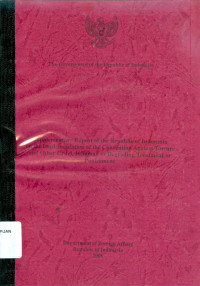
Text
Supplementary report of the republic of Indonesia on the implementation of the convention against tortune and other cruel, inhuman or degrading treatment or punishment
Indonesia, the 3rd largest democratic country in the world, with 230 million populations that makes it the 4th largest population, signed the International Convention against Torture and Other Cruel, Inhuman or Degrading Treatment or Punishment on 23 October 1985 and ratified it on 28 October 1998 through Law No. 5/1998. 2. In accordance with Article 19 of the Convention, Indonesia submitted its initial report in February 2001 on the implementation of the Convention to the UN Secretary General and subsequently the Committee against Torture considered it during its 492nd and 495th meetings on 12 and 19 November 2001. 3. To demonstrate further its unwavering commitment to the implementation of the Convention, the Republic of Indonesia decided to submit its First Periodical Report or the second report in accordance with Article 19 of the Convention, which covers the developments mainly from 1999 until 2003. However, it also covered developments prior to 1999 particularly information related to the questions raised and information requested by the Committee in its concluding observation (CAT/C/XXVII/Concl.3), and significant developments until 2005. 4. The Government is of the view that information on Indonesia’s political structure, legal and administrative framework and practical measures in the prohibition of torture has been described in details in the Initial Report hence it is not necessary to repeat it in this periodic report. In addition, the Initial Report has also attached important documents, which can always be used as reference in this Report i.e. the Constitution of 1945; MPR’s Decree No. XVII/1998 on Human Rights; Law No. 39/1999 on Human Rights; The Penal Code of Indonesia; Government Regulation in lieu No. 1/1999 on Human Rights Court; Law No. 8/1981 on the Law of Criminal Procedure; Law No. 2/2002 on Indonesian Police; and Law No. 1/1979 on Extradition. 5. In this second report, the annexes include the 4th Amendment of the 1945 Constitution; Law No. 26 of 2000 on Human Rights Court; National Plan of Action on Human Rights 2004-2009; and the executive summary of the report of the Commission of Inquiry into Human Rights Violations (KPP HAM) in Papua/Irian Jaya. 6. One of the most important developments in the field of human rights in Indonesia since the Initial Report was the promulgation of Law Number 26/2000 on Human Rights Court, which guarantees that any violations of human rights will be brought to justice. The Presidential Decree No. 40/2004 on Human Rights Plan of Action for the period 2004-2009 which explicitly reflects Indonesia’s commitment to materialize its efforts in respecting, promoting, fulfilling and protecting human rights to all Indonesian citizens is also essential. According to Law Number 26/2000, the right to be free from torture or its attempts is one of the major important components of human rights. Article 9 of the Law clearly stipulates that the Human Rights Court has the authority to adjudicate “torture” if it was carried out or used by officers to gain information or confession either from the suspect, or a third person; or to intimidate or force the suspect or a third person; or as an expression of discrimination in any form.
Availability
| KP.1.000306 | KP.1 IND s | My Library | Available |
| KP.1.000306-01 | KP.1 IND s | My Library | Available |
| BK00926PerpusKP | My Library | Available | |
| BK00927PerpusKP | My Library | Available |
Detail Information
- Series Title
-
-
- Call Number
-
KP.1 IND s
- Publisher
- Jakarta : Departemen Luar Negeri., 2006
- Collation
-
162p. ; 29cm.
- Language
-
Indonesia
- ISBN/ISSN
-
-
- Classification
-
KP.1
- Content Type
-
-
- Media Type
-
-
- Carrier Type
-
-
- Edition
-
-
- Subject(s)
- Specific Detail Info
-
-
- Statement of Responsibility
-
-
Other version/related
No other version available
File Attachment
Comments
You must be logged in to post a comment
 Computer Science, Information & General Works
Computer Science, Information & General Works  Philosophy & Psychology
Philosophy & Psychology  Religion
Religion  Social Sciences
Social Sciences  Language
Language  Pure Science
Pure Science  Applied Sciences
Applied Sciences  Art & Recreation
Art & Recreation  Literature
Literature  History & Geography
History & Geography